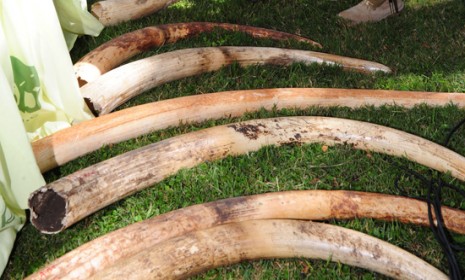Inside Africa's bloody elephant-poaching war
In what has become an increasingly violent conflict, the ivory trade leaves thousands of elephants dead every year, as well as hundreds of guards and poachers

A free daily email with the biggest news stories of the day – and the best features from TheWeek.com
You are now subscribed
Your newsletter sign-up was successful
Disturbingly, the World Conservation Congress reports that, in 2011, elephant poaching reached its highest rate since the global ivory ban was enacted in 1989. Last year at least 25,000 of the tusked animals were slaughtered for their ivory, which can fetch thousands of dollars apiece thanks to growing demand in Asia. But there's also a human toll to this violent conflict: Hundreds of rangers and poachers have died in what's become an increasingly gruesome anti-poaching war. What can be done to stop the bloodshed? Here, a concise guide:
What's happening to the elephants?
In the 1930s and 1940s, there were as many as five million African elephants on Earth. Now populations have dwindled to between 472,000 to 690,000. Poachers are even employing dubious new methods to go after the animals, including poison, which other animals often mistakenly ingest. But guns are still the traditional weapon. African forest elephants, of which there are only 20 left on Earth, are particularly valuable because their tusks are large enough to reach the ground; one specimen, Baghdad (so called because his ears bear bullet scars), would be worth approximately $100,000, says Christine Dell'Amore at National Geographic. The animals' tusks are highly coveted status symbols in Asia, where ivory is often used in artistic pieces.
The Week
Escape your echo chamber. Get the facts behind the news, plus analysis from multiple perspectives.

Sign up for The Week's Free Newsletters
From our morning news briefing to a weekly Good News Newsletter, get the best of The Week delivered directly to your inbox.
From our morning news briefing to a weekly Good News Newsletter, get the best of The Week delivered directly to your inbox.
How do rangers and poachers fit in?
African park guards are engaged in a "rarely discussed low-level war" against illicit hunters in a conflict that's become "increasingly militarized," says Louisa Lombard at The New York Times. This year, dozens of rangers were killed on duty, including 15 members of the Kenya Wildlife Service. "We're going into a phase now where we're basically at war," says Lee White, head of the national park system in the west African country of Gabon. "We're shifting from biologists being out there in these parks to military people being out there."
How bad is the bloodshed?
"It is difficult to know exactly how many people have died," says the Times' Lombard. While the deaths of anti-poaching guards are tallied, the corpses of poachers themselves are often buried in hidden bush graves. Some guards claim to have killed hundreds of poachers in the past few years. In a "particularly macabre" case from 2007, in a remote tucked away corner of the Central African Republic, the grisly bodies of roughly a dozen hunters were left mutilated by heavily armed guards and rangers. Witnesses say they saw "human limbs hanging from tree branches."
A free daily email with the biggest news stories of the day – and the best features from TheWeek.com
How do we stop the war?
The only way to stop the slaughter of humans and elephants alike is to "reduce demand for ivory," says Lombard. "And that's a very tall order." Demand for elephant tusks in countries like China, Thailand, and the Philippines is often driven by Catholics, Buddhists, and followers of other religions who believe the ivory honors God.
What can be done about that?
World Wildlife Fund director of the Sacred Earth Program Dekila Chungyala says that conservationists just aren't getting their anti-poaching message across, and that new approaches like appealing to religious leaders must be made. "Faith leaders are the heart and backbone of local communities," says Chungyala. The WWF can yell all it wants, and no one will listen. A religious leader, on the other hand, can say, "This is not a part of our values. This is immoral." It will not be easy, says Nick Brand, a wildlife photographer and founder of the conservation group the Big Life Foundation. "Until demand for ivory and other animal parts from China and the Far East is radically reduced, there are many many other areas, indeed most areas of Africa, where, yes, tragically, the war will be lost."
Sources: CBS News, National Geographic, The New York Times (2)
-
 How the FCC’s ‘equal time’ rule works
How the FCC’s ‘equal time’ rule worksIn the Spotlight The law is at the heart of the Colbert-CBS conflict
-
 What is the endgame in the DHS shutdown?
What is the endgame in the DHS shutdown?Today’s Big Question Democrats want to rein in ICE’s immigration crackdown
-
 ‘Poor time management isn’t just an inconvenience’
‘Poor time management isn’t just an inconvenience’Instant Opinion Opinion, comment and editorials of the day